Running a business is like being a mom.
Sometimes your children behave like little angels. Other times they drive you crazy. And if you don’t know how to manage their bad behavior, eventually they’ll get in trouble — and so will you.
The same way, if you can’t manage the good, the bad, and the ugly of your business, you won’t get very far — and you could get into serious problems too.
That’s why we created this guide: to introduce you to business management and show you how it can impact your business in a positive way.
Let’s dig in.
What’s business management?
In short, business management is the process of planning, organizing, directing, and controlling all the resources and operations of a particular business in the most efficient and effective way possible.
The main objective of business management is to make the right decisions — decisions that lead to growth.
As we’ll cover a bit later, you do it through a mix of disciplines, such as HR, marketing, project management, IT, and accounting, among others.
Now let’s talk about its importance.
Why does it matter?
Managing a business is a bit like cleaning your room. If you don’t do it continually, you’ll end up with a mess in less than a New York second, and the chaos will blind your sight.If you can’t see clearly, how could you make decisions?
You can’t.
Business management is all about keeping your organization neat and functional, and understanding how you’re doing against your goals.
It’s also about plugging financial leaks and increasing revenue.
Without the right management practices, that becomes a rather unfeasible job.
What’s the role of a business manager?
Now that you understand what business management is and why it matters, let’s talk about its role — what does a business manager do?
Well, some of the most vital duties of a business manager include:
- Supervise employees: train employees, hold them accountable, and provide them with all the tools they need to stay productive and increase performance.
- Design and oversee operations: streamline business operations to increase efficiency, reduce costs, and maximize revenue.
- Find and create opportunities for growth: expand to new markets, create associations, and create effective promotions.
- Find and hire new talent: prepare a list of skills for different jobs, evaluate candidates, and hire new employees.
- Make financial decisions: decide how to manage profits, where to invest capital, and design strategies to keep the business’ assets safe.
Now, this isn’t a comprehensive guide on all the responsibilities of a business manager, but they include some of the most common (and crucial).
How much does a business manager make?
At this point, you’re probably wondering whether a bachelor’s degree in business management is a good career path. So let’s quickly cover how much business managers make in the United States.
According to ZipRecruiter, the average annual salary for a business manager is $61,153.

Obviously, this differs depending on your industry, experience, and other factors. For instance, the average salary for a consulting position in business management is $111,822 per year.
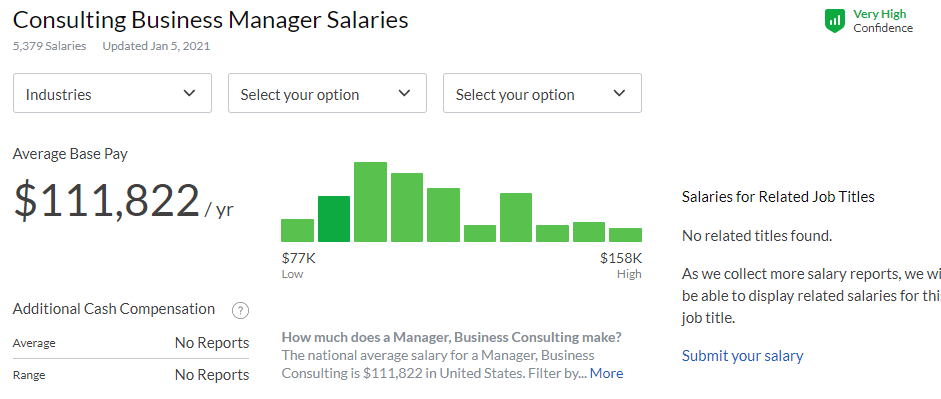
Does business administration offer a good career pathway?
Well, it depends on your career goals and what “good” means for you.
Broadly speaking, if you aspire for a leadership position, we suggest you perform industry research to understand what employers are looking for and focus on that.
Now, do you need college education to become a business manager?
The answer is yes.
Even though not all managers have a business management degree, the market is becoming more and more competitive and most employers are looking for, at least, business management graduates.
If you’re considering business management as your career path, you should find a business school that fits your needs and get a degree.
What can you expect in a business management program?
Being a leadership role, business management requires a deep understanding of all the moving parts that make up your organization — finances, marketing, strategy, HR, operations, etc.
Of course, you could specialize in a specific area, but as a doctor needs to understand how the body works, any effective business management student must understand how a business operates.
Remember that management is all about decision-making. If you don’t deeply understand each of your functions, you’ll struggle making the right decisions.
So let’s talk about the role that business administration plays in each of the departments as well as what you should expect in a business management degree program.
Economics
Economics is the foundation for everything business — it provides the rules and guidance in which you’ll operate.
For instance, if you don’t understand the law of supply and demand, it’d be hard for you to set the right pricing strategies in your market. Or if you know nothing about how markets fluctuate, you probably won’t make good decisions.
In short, if your business is a boat, then economics is the ocean.
Accounting
Let’s say you’re lost in a country where nobody speaks English. You don’t speak the native language either. And there’s no Google maps. Nor Facebook. Not even internet connection.
Awful, right?
Well, that’s how your business would operate without accounting and finances.
You see, numbers is the language of business. And not speaking that language is a huge handicap for good decision-making. Any effective manager must know accounting — the key for understanding the overall health of your business.
Now, we can split accounting into 2 categories:
- Financial accounting: to provide valuable information to people outside the company (investors, bankers, government, etc.).
- Managerial accounting: to improve decision-making within the company.
Employee onboarding and engagement
According to Gallup, there’s a high correlation between exceptional onboarding and employee engagement.
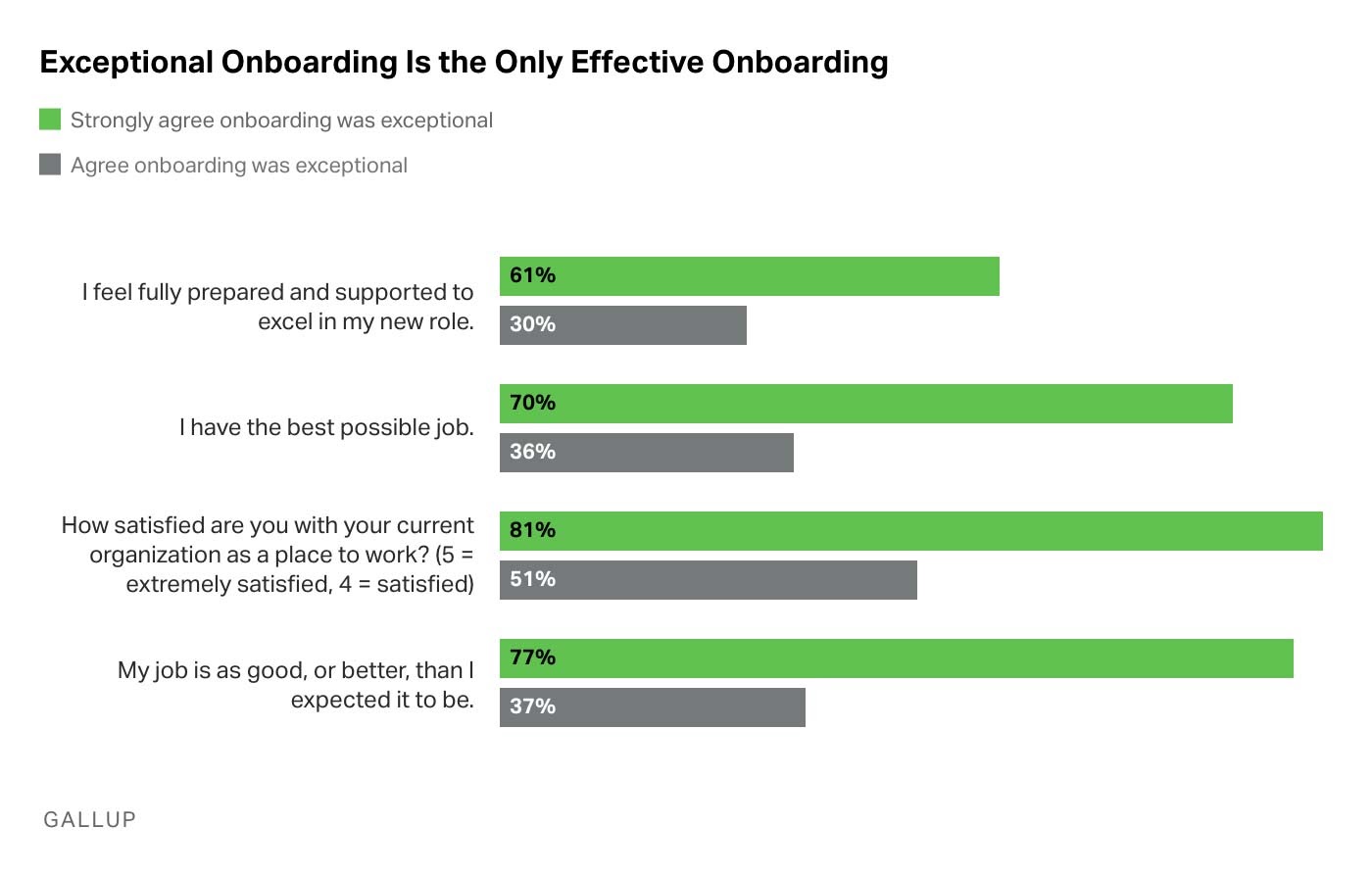
The same analysis reveals that the manager alone is accountable for 70% of the variation in the engagement of any team.
What does this mean for you?
Well, human resource management is vital and if employees feel unsatisfied or unengaged, it’ll probably be your fault.
People are one of the most (if not the most) crucial assets of any organization. In a management position, you must understand all the nuances of organizational behavior and develop solid interpersonal skills.
Also, you must personalize the onboarding experience to each employee’s role.
Marketing and sales
Many people call marketing and sales “the lifeblood of a business.” Others call them “the fuel of the engine.” But however you call them, we can’t argue they’re crucial for the success of any team.
As a marketing manager, some of your activities involve:
- Market alignment: making sure the products and services resonate with customers’ needs.
- Pricing: designing profitable pricing structures based on market trends.
- Placement: making the products accessible for customers with efficiency.
- Promotion: increase product awareness, drive sales, and improve brand loyalty.
- Compliance: guarantee that every campaign and initiative complies with law and industry standards.
Customer support
If acquiring new customers is important for the success of any business, then keeping those customers happy is even more crucial.
According to Microsoft, 95% of consumers believe customer support is vital for brand loyalty.
Another study suggests that 90% of customers will even stop buying from a specific brand if they offer a deficient customer support experience.
That’s why implementing management practices to streamline the customer support process is a must for any business. Some of these practices include:
- Designing and organizing training programs to improve the quality of service.
- Defining responsibilities for the role and finding the right talent.
- Choosing the right technology to perform activities with more efficiency.
- Setting KPIs and measuring progress continuously.
Operations
In short, business operations define how things are done in your organization — it’s the administration of all the processes to maximize revenue, decrease costs, and improve efficiency.
For instance, if you manage a manufacturing company, your operations would include all the processes you use to transform raw material into a final product. Or if you run a software development agency, your operations define all the steps you take from initiation to delivery.
As a manager, you’re in charge of designing, planning, controlling, and directing the operations strategy within your team and making sure everything gets done.
MIS
MIS stands for Management Information Systems and it’s the process of “computerizing” your business. It’s about choosing the right technology, software, and networks to improve the overall results and measure progress.
In today’s day and age, no business operates without, at least, basic technology. So any effective business manager must have practical knowledge on how to use the most common software and platforms in the industry.
Project management
PMOs (Project Management Offices) are becoming more and more popular. According to Wellingtone — a UK-based project and portfolio management consultancy — 89% of organizations state having at least one PMO.
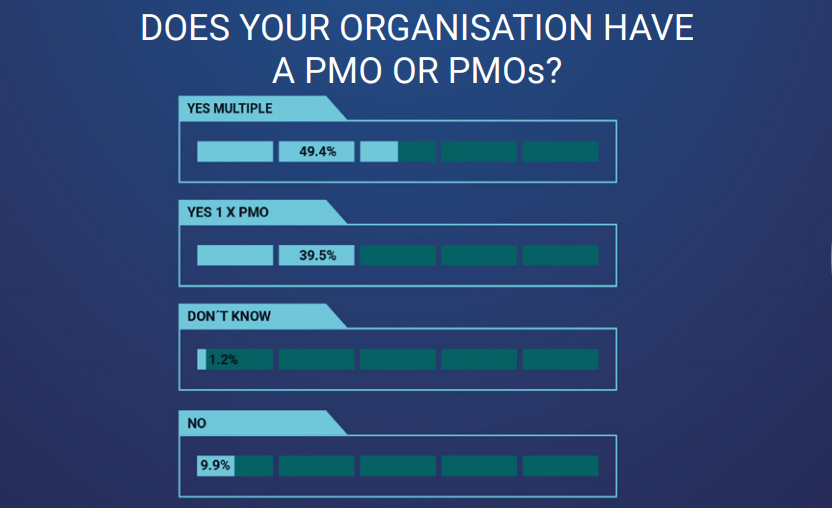
That’s why business managers need to understand what a successful project looks like and develop the skills required to train, monitor, and evaluate project managers within the organization.
Besides, you need to make sure your company’s projects are aligned with the overall goal. Otherwise, you can waste resources on activities that don’t move the needle.
Some of the activities involved with project management include:
- Reporting: making sure the team is meeting KPIs and reporting key stakeholders and leadership on the progress of each project.
- Portfolio management: selecting, organizing, and prioritizing the projects within your company.
- Standardization: streamline project management practices and ensuring everyone complies with quality standards.
- Training: train project managers on the use of software and common practices.
Legal
As business management is pretty related to human resources — talent hunting, hiring, training new employees, and even firing people — you need to understand all the laws and regulations that directly affect employment and labor.
For instance, according to U.S. Bureau of Labor Statistics, foreign-born workers made up 17.4% of the labor force in 2019. If you don’t understand all the steps associated with hiring foreigners, you could get into trouble.
And that’s just one of the many nuances related to employment.
You must understand immigration law, labor law, salary laws, and everything associated with the management of people.
Introduction to business management software
Imagine that you want to travel from New York to Los Angeles.
What’s the fastest way to do it?
By airplane, right?
Well, in business there’s also different “vehicles” you can use to achieve your goals and some of them are more efficient than others.
For instance, you could monitor your employees performance with spreadsheets and pen and paper, but that’d be a headache-inducing job.
There’s a smarter way…
Business management software.
What’s a business management software?
Business management software — also known as Work OS (Operating System) — is a set of programs and apps that help you streamline your processes through automation and effective collaboration tools.
By “merging the flesh with the machine,” you can reduce risk of error, increase efficiency, and deliver better results.
For instance, if you’re a construction company, a Work OS can help you manage all your employees, projects, and clients under one roof and measure progress at a glance. You can also calculate costs and avoid waste.
If you’re a sales manager, you can use this type of software to manage your sales reps, calculate commissions, and measure revenue generated..
Or if you manage a manufacturing company, the right digital workspace can help you streamline your operations, get rid of silos between departments, and increase transparency across your organization.
In short, no matter whether you’re a small business with just a few employees or a huge enterprise tackling highly complex projects, the right software will revolutionize how you manage your business.
Types of business management software
Not all software is made the same. Here are 6 different types you should be aware of:
- Collaboration: to communicate with your team and keep relevant information handy for everyone.
- Payroll management: to manage payroll, calculate invoices, and make sure your team gets paid on time.
- Accounting: to track revenue and expenses, and keep on track of the overall health of your business.
- Project management: to manage projects from start to finish and collaborate with your team effectively.
- CRM: to manage customer relationships and drive sales growth.
- All-in-one: a robust software that merges all the different types of software into one functional platform.
How to choose the right software?
To be honest, that’s a difficult question as it depends on your needs, the size of your team, and your specific goals.
To help you decide, let’s cover what monday.com is, how it can help you, and a quick overview of everything we offer.
What’s monday.com?
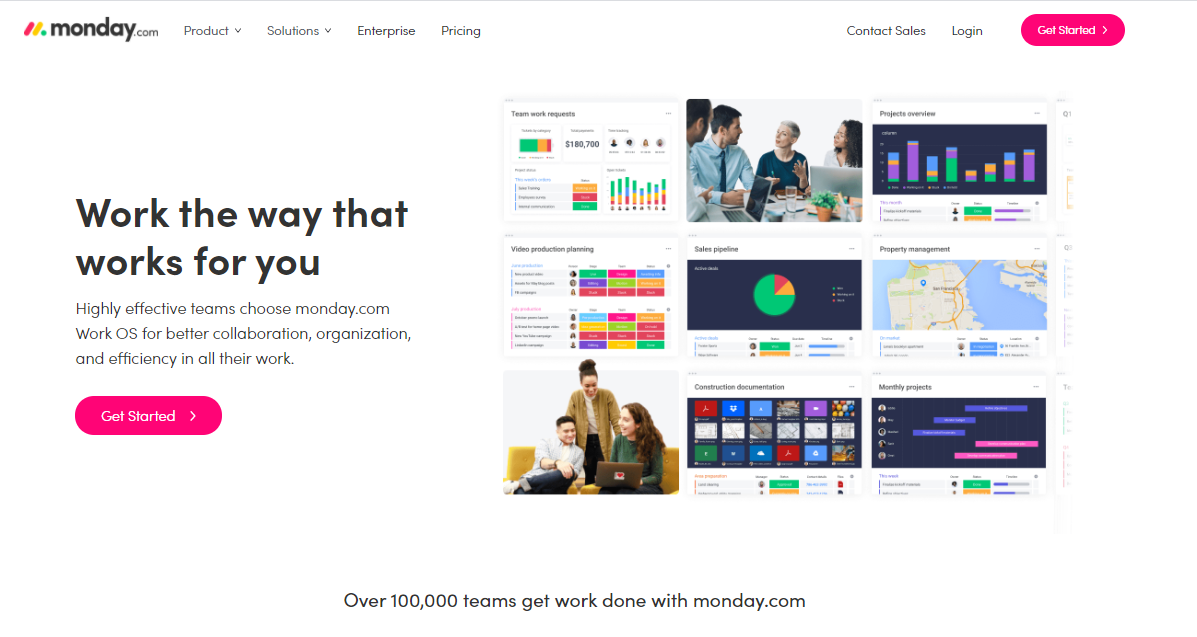
monday.com is a flexible yet powerful Work OS designed to help you work and collaborate with efficiency.
For example, you can create business communication channels across all your departments — marketing, HR, IT, management, etc. — and centralize all your information in one place.
Also, you can bring in all your team members, communicate in real-time, and design a workflow that resonates with your company.
Currently, more than 100,000 brands across multiple industries — including Coca-Cola, Adobe, and Universal Studios — use our platform to tackle their projects and manage their teams.
Core features:
Here are some of monday.com’s core features:
- Automations: automate up to 250,000 human actions and save time on repetitive, tedious work.
- Communication: get access to powerful collaboration features including file sharing, instant messaging, and video conferencing.
- Integrations: integrate your favorite tools and consolidate your data into one platform.
- Security: get access to enterprise-level security and keep your customer data safe.
- Flexibility: design any type of workflow, customize your reports, and visualize data in a way that suits your needs.
We suggest you read our product overview page to get a full description of all our features and benefits.
Why monday.com?
As we covered in this guide, business management involves many different activities — human resource management, marketing, operations, project management, accounting, and many more.
So, why monday.com?
In short, we offer an all-in-one solution so you can manage all of these departments in the same place. By centralizing your information, you can improve efficiency, reduce friction, and deliver better results.
Now, even though we’re a pretty robust Work OS, we’re also simple to use and flexible.
When you create an account, you’ve access to boards, columns, widgets, integrations, and hundreds of automations to design any type of workflow you can imagine.
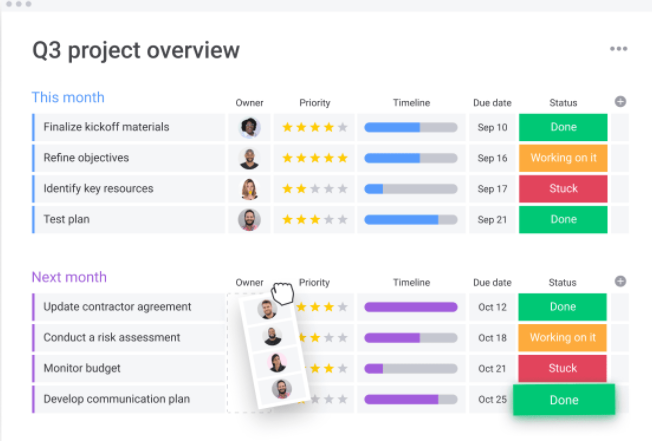
The best part?
It’s so simple you don’t require training.
Once you finish our simple onboarding process, you can start working in minutes (literally).
To make the job even easier, we provide you with over 200 customizable templates for any industry and use case.

Simply take a look at our list of templates, install one that makes sense for your business, adapt it to your needs, and voila! You’re done.
It’s that simple.
Some of our most popular templates include:
- Client management template
- CRM template
- Business process management template
- Employee onboarding template
- Recruitment tracker template
- Project planning template
- Quarterly objectives template
Manage your business the right way
In today’s day and age, no business can operate without the right management processes. And hopefully now you understand how to start on the right foot.
Also, the right software can make the job so much easier. With automations and multiple functionalities, you can save tons of time while improving your bottom line.
If you’re looking for a platform that’s simple to use and powerful at the same time, then monday.com might be the right choice.
To decide for yourself, make sure to try one of our customizable templates.

